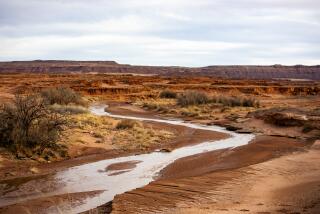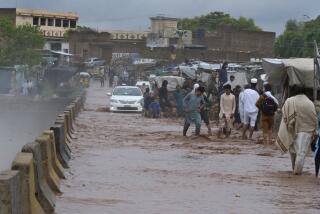Global Development: Hungry, drought-stricken corner of Pakistan is a land where ‘humans don’t have water to drink’

Abdul Hameed walks along the edge of the Chiltan dam’s dry reservoir to a hut, where he spends his days watching for passing animals that could be threatened by hunters. Lately, the provincial wildlife ranger says, the beasts have been scarce.
“There used to be ibex, markhor goats, other wildlife,” said Hameed, 49. “But they are migrating from the Chiltan because most of the ponds have gone dry.”
It is a common lament here in Baluchistan, Pakistan’s most expansive but poorest province, which is suffering from a prolonged drought so dire it has triggered a health crisis. Since the 1960s, residents have had one main demand from every provincial government: Give us water.
In 2013, the government optimistically built the Chiltan dam outside Quetta, the provincial capital, to provide water for villages like Qilli Haji Ishaq Khan, where Hameed lives. But with little rain since then, the dam has been of scant value.

Hameed’s family is so tied to his village in the mountains outside Quetta that it is named for his elder brother, Haji Ishaq Khan Sumalani. They and other Sumalani tribespeople have lived in this dry area for 150 years, once bringing in water on camelback and building a pond in the early 2000s to collect rainwater.
Now that pond is dry. Out of the 50 families that once lived in the village, 20 have left because of the water crisis and settled in other villages, Hameed said.
“Humans don’t have water to drink here,” Hameed said. “I doubt if we can stop the migration of wildlife, because as human beings, we are thinking of leaving to live in a place where we have water.”
Baluchistan, which covers 40% of Pakistan’s land area, has long suffered from poverty, official neglect and separatist violence. Despite large stores of natural gas and mineral resources in the province, United Nations figures say that 71% of its 12 million people live in poverty.
Five years ago, officials announced plans to build 100 small dams to divert water to towns and villages, but few have been completed. Amid years of scarce rainfall blamed in part on climate change, wells are running dry and most residents must purchase water to drink and bathe.
According to the provincial government, 62% of Baluchistan lacks safe drinking water and more than 60% of its land is not cultivable.
As the water crisis has worsened, so has the hunger rate in Baluchistan, with provincial health ministers declaring a malnutrition emergency in late November.
Officials estimate that 16% of the children here suffer from acute malnutrition and that 40% under the age of 5 are underweight. More than half suffer from stunted growth and face vitamin deficiencies.
Provincial health minister Naseebullah Marri said Baluchistan officials have pressed the federal government in Islamabad for urgent help to battle the drought and nutrition crisis.
But provincial Assembly member Sanaullah Baloch said that “nothing has been done.”
“The government thinks that they can end drought by distributing some food,” Baloch said. “The government needs proper planning, policies and execution of those policies — in which the Baluchistan government lags behind.”
Haibat Khan Marri, a 40-year-old security guard in Quetta who is not related to the health minister, said five of his eight children were deemed to be malnourished during a recent health screening. He lives in a neighborhood called New Kahan Marri, where 60% of the children are listed as being malnourished — the highest rate in the province.
On his $170 monthly salary, Marri said, he can’t afford to buy meat or other protein for his family. His wife, who is pregnant, has not been able to breastfeed their youngest children, so he has to buy infant formula, which they mix with packaged water.
For malnourished children, the government has provided emergency food supplements. But some experts say the government needs to do more.
“It is a multi-sector issue which only can be tackled when the government resolves poverty, the water crisis and drought-related issues” together, said Faisal Muhammad, a nutrition expert at UNICEF.
Many in New Kahan Marri opposed the Pakistani government in the 1970s and left for Afghanistan, returning after a military coup and the execution of Prime Minister Zulfikar Ali Bhutto. Asked why the current government hadn’t done more for New Kahan Marri, the health minister dismissed the residents as migrants and terrorists.
In September, newly elected Prime Minister Imran Khan, who ran on a populist platform, said at a meeting of provincial leaders that he would resolve the water crisis in Baluchistan and neighboring Sindh province. But so far there is little to show for Khan’s pledge.
Many experts believe that funds intended for health emergencies have been squandered to corruption. While officials have banned residents from drilling their own wells in Quetta — to prevent a worsening of the water shortage — some people have drilled unlicensed wells while authorities look the other way, said Imran Alyani, chief engineer with the provincial public health department.
Hameed, who has eight children, now buys water to survive. Of his $200 monthly salary, he estimates he spends more than one-third on water.
“We have submitted a letter to every government for providing us water,” Hameed said. “We demand a well that can meet our water needs, but the government never listens to weak voices.”
Baloch is a special correspondent.
More to Read
Sign up for Essential California
The most important California stories and recommendations in your inbox every morning.
You may occasionally receive promotional content from the Los Angeles Times.










